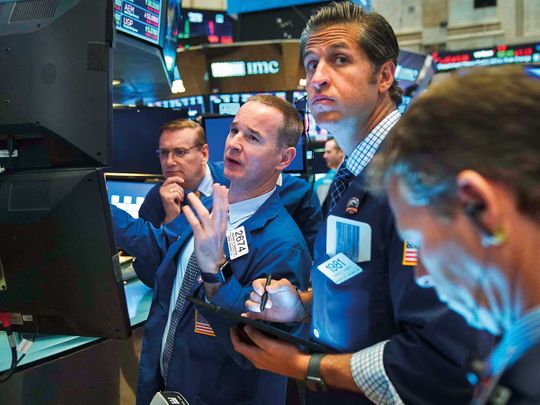
Dubai: As geopolitical concerns among investors were renewed on deteriorating relations between US and China, market will keep an eye out for any new developments on that front this week, alongside any progress made towards a COVID-19 vaccine.
Markets headed into the weekend amid high uncertainty as a relentless spat between the world’s top two economies escalated to new highs, after a new round of tit-for-tat measures from both countries.
US-China spat escalates
Both the countries last week ordered closing of one consulate each of the other and the news sent global stocks lower. The Shanghai Composite closed down 3.9 per cent, while European shares fell sharply in early trading.
Analysts say that any further development on this front will impact trading next week and that any further flare-up may affect the markets negatively. Washington and Beijing have been at each other’s throats over numerous issues recently, ranging from trade to the coronavirus pandemic and China’s policies on Hong Kong, Xinjiang and the South China Sea.
More troubles in US
Also, an increase in US jobless claims — for the first time since late March — was an indication analysts saw as the economic recovery having lost steam as COVID-19 cases spike across much of the country. The data sent Wall Street’s benchmark major S&P 500 tumbling 1.2 per cent after the news.
Meanwhile, global oil and gas majors are likely to report a weak set of second-quarter results over the next two weeks, energy analysts forecasted, while staying optimistic that earnings for the three-month period through to the end of June will mark the worst of 2020.
Oil majors to report weak Q2
Global oil majors, referring to the world’s largest oil and gas majors ‘Big Oil’, witnessed a historic fall in oil and gas prices during the second quarter as coronavirus lockdown restrictions coincided with an unprecedented demand shock.
Brent crude futures tumbled to their lowest level since 1999 on April 21, while US. West Texas Intermediate futures plunged into negative territory for the first time on record. Energy regulatory bodies widely regard 2020 as the worst year in the history of global oil markets, with so-called “Black April” likely to be the worst month the industry has ever seen.
While the Dubai Financial Market (DFM) gained 0.3 per cent at 2,059 points, the Abu Dhabi Securities Market (ADX) rose 0.57 per cent at 4,285 points.
The Dubai and Abu Dhabi bourse benchmarks have been cautiously rebounding the past weeks, mirroring the global stock markets, with the existing trend seen continuing in the days to come.
After dropping about 4 per cent in the month of May, the DFM rose 6 per cent in the month of June. Similarly, the ADX slipped 2 per cent in May and rose 3.5 per cent last month.
Among other major stock markets in the GCC region, Saudi Arabia’s benchmark index dipped by 0.3 per cent, mostly driven down by near 1 per cent fall by the stock of oil behemoth Saudi Aramco.
The value of kingdom’s oil exports dropped by 65 per cent year on year in May, representing a fall of nearly $12 billion (Dh44 billion), official data showed on Thursday.








